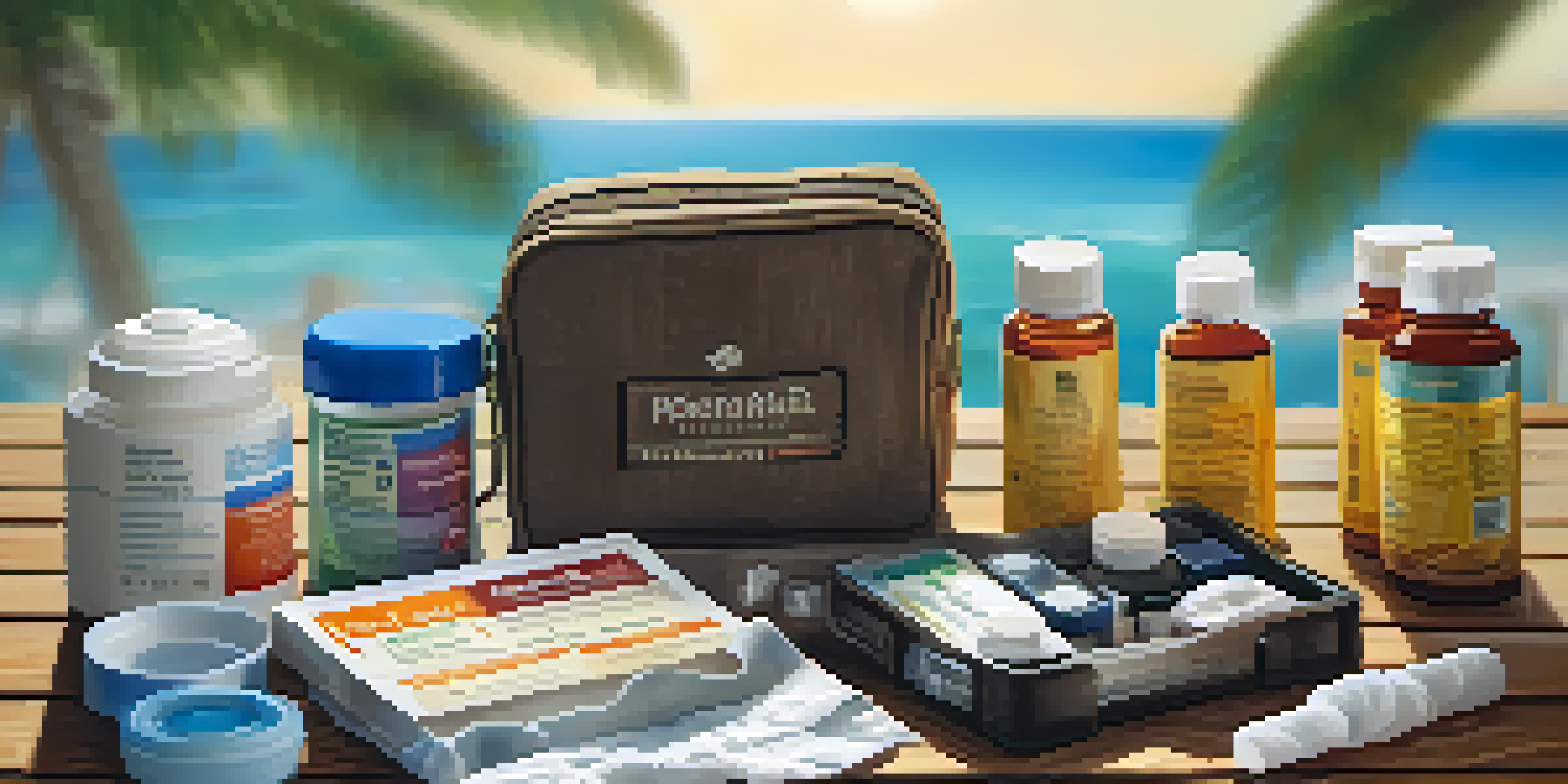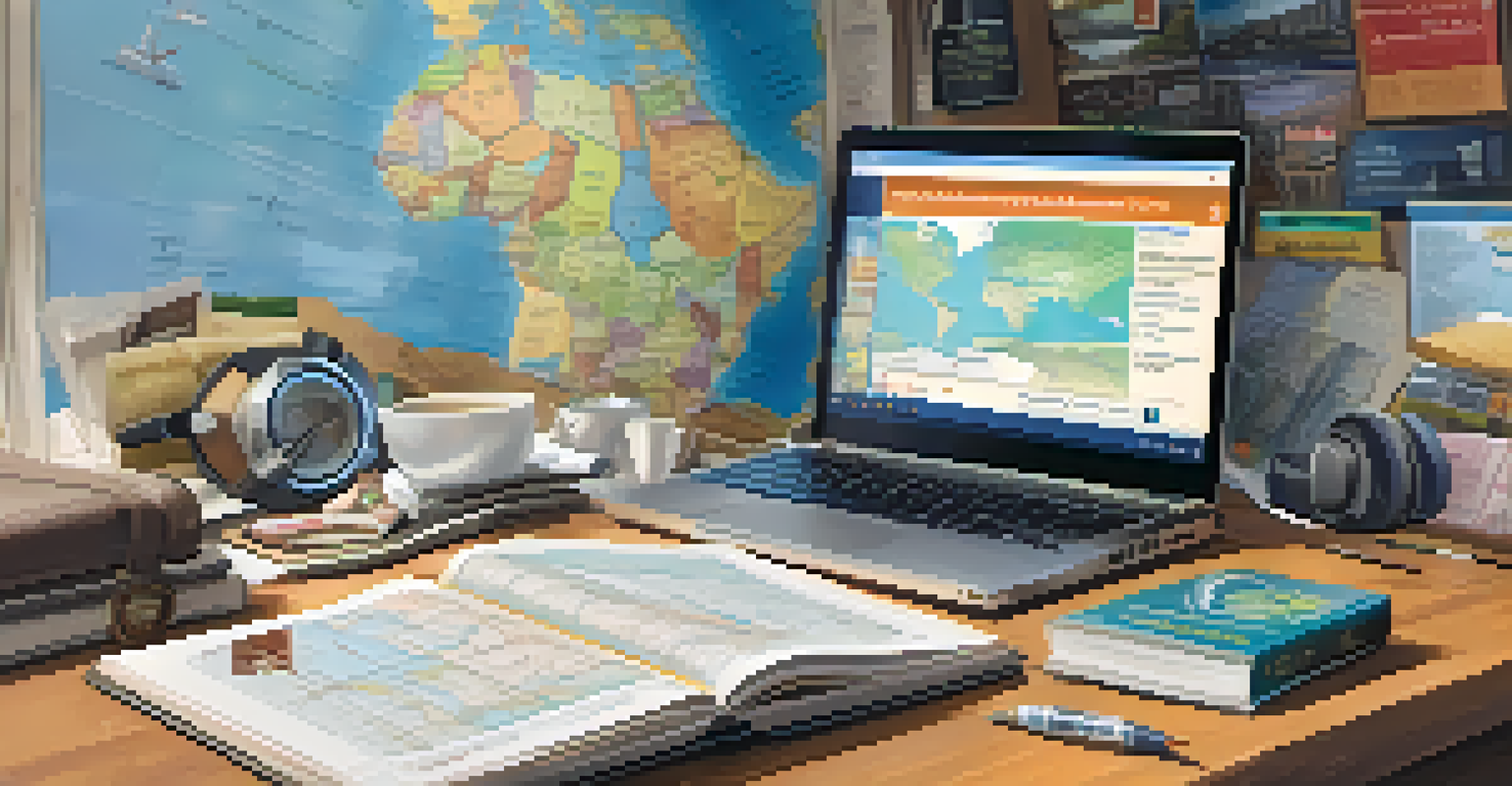How to Minimize Risk of Illness While Traveling Abroad

Research Your Destination's Health Risks
Before you pack your bags, take the time to research any health risks associated with your destination. Certain regions may have endemic diseases or specific health advisories issued by health organizations. Websites like the CDC or WHO provide up-to-date information that can help you prepare and stay informed.
Traveling – it leaves you speechless, then turns you into a storyteller.
Knowing what to expect can help you take preventive measures, such as vaccinations or medications. For instance, if you're traveling to an area where malaria is common, your doctor may prescribe prophylactic medication. Awareness is key to avoiding unpleasant surprises during your trip.
Additionally, consider reaching out to locals or expats who live in the area. They can offer invaluable insights on current health concerns and safety precautions that may not be widely reported. This local knowledge can enhance your travel experience while keeping you safe.
Stay Up-to-Date with Vaccinations
Vaccinations are one of the simplest yet most effective ways to protect yourself from illness while traveling. Before your trip, check which vaccines are recommended or required for your destination. Some vaccinations, like those for hepatitis A or typhoid, can help prevent serious illnesses that are more prevalent in certain regions.

It’s wise to schedule an appointment with your healthcare provider several weeks before your departure. This allows ample time for any necessary vaccines to take effect. In some cases, you may need multiple doses, so planning ahead is crucial.
Research Health Risks Before Travel
Understanding health risks at your destination helps you take preventive measures and avoid surprises.
In addition to routine vaccines, consider getting travel-specific vaccines based on your itinerary. For example, if you're visiting Africa or South America, you may need a yellow fever vaccination. Staying proactive about your health can make all the difference.
Practice Good Hygiene While Traveling
Good hygiene is your first line of defense against many illnesses while traveling. Simple practices like washing your hands regularly can significantly reduce your risk of infections. Carry hand sanitizer for situations where soap and water are unavailable—think public transport or busy markets.
To travel is to discover that everyone is wrong about other countries.
Be cautious about what you eat and drink, especially in areas where water quality is questionable. Opt for bottled water and avoid ice unless you’re sure it’s made from purified water. Street food can be delicious, but be mindful of how fresh the food is and whether it’s cooked thoroughly.
Lastly, remember to avoid touching your face, especially your eyes, nose, and mouth, as this can transfer germs. Wearing a mask in crowded places can also help protect you from airborne illnesses, especially during flu season or pandemics.
Stay Hydrated and Eat Wisely
Staying hydrated is essential, particularly in hot climates or when engaging in physical activities. Dehydration can weaken your immune system, making you more susceptible to illness. Always opt for bottled or purified water to avoid waterborne diseases, and try to drink at least eight glasses a day.
Eating wisely plays a crucial role in maintaining your health while traveling. Prioritize fresh, well-cooked meals and avoid raw or undercooked food, which can harbor harmful bacteria. If you’re unsure about the hygiene practices of a food vendor, it’s better to err on the side of caution.
Stay Updated on Vaccinations
Scheduling vaccinations ahead of your trip is crucial for protecting your health against region-specific illnesses.
Also, consider packing some healthy snacks for your journey. Nuts, dried fruits, or granola bars can provide energy and prevent you from reaching for unhealthy options when hunger strikes. Keeping your body nourished helps you stay alert and enjoy your travels.
Pack a Travel Health Kit
A well-stocked travel health kit can be a lifesaver when you’re on the go. Include essential items such as pain relievers, antihistamines, and any prescription medications you may need. Don’t forget first-aid supplies like band-aids, antiseptic wipes, and insect repellent, especially if you’re heading to rural areas.
Consider including items for common travel-related issues, like motion sickness tablets or diarrhea medications. Being prepared for minor ailments can prevent them from ruining your trip. Plus, many countries may not have familiar medications available, so having your own stash is wise.
Lastly, make sure to have a copy of your health insurance information and any necessary medical contacts. Knowing where to seek help in case of an emergency can give you peace of mind and help you navigate healthcare systems abroad.
Be Mindful of Local Health Advisories
Once you arrive at your destination, stay alert to local health advisories. Authorities may issue warnings about outbreaks or environmental hazards, so keep an eye on the news. Joining local social media groups can also provide real-time updates from residents.
If you’re staying in a hotel or resort, don’t hesitate to ask the staff about health and safety measures in place. They can often provide tips on how to stay safe and healthy during your visit, such as avoiding certain areas or being cautious with food and water.
Pack a Travel Health Kit
Having a well-stocked health kit ensures you’re prepared for minor ailments while traveling.
Understanding and respecting local customs around health can also enhance your experience. For instance, in certain cultures, it’s customary to greet people with a handshake, while in others, a nod may be more appropriate. Being culturally aware can help you navigate social interactions comfortably.
Know Emergency Contacts Before You Go
Before you embark on your journey, familiarize yourself with local emergency contacts, including hospitals, clinics, and your country's embassy. Having this information handy can save precious time in case of a health crisis. Make sure to save these numbers in your phone and write them down as a backup.
Also, consider registering with your embassy or consulate upon arrival. This can be particularly helpful in case of natural disasters or political unrest. They can provide assistance or guidance during emergencies, making your trip safer and more enjoyable.

Lastly, share your travel itinerary with a trusted friend or family member back home. This way, someone knows where you are and can check in on you if necessary. Communication is key to ensuring your safety while traveling abroad.